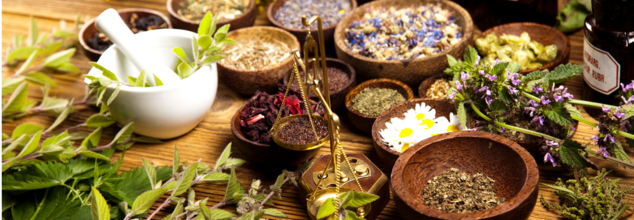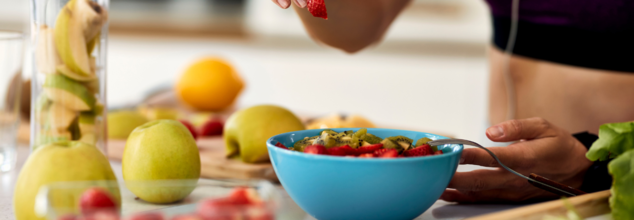
Ayurvedic Herbs for Detox
5 Best Ayurvedic Herbs That Are Natural Cleansers For Your Body
Ayurveda is a 5000 year old science that offers abundance of knowledge and wisdom on natural foods, herbs and cleansers to detoxify our body. Natural herbs plays a powerful role in cleansing the body of toxins and preparing the body for detoxification. It helps enhance digestion, metabolism, immunity and supports bodily functions. It helps purify the body and thus allows you to become the healthiest version of yourself.
Here are five of the best Ayurvedic herbs recognized for their natural cleansing properties.
1. Tulsi (Holy Basil)
Tulsi, also called as Holy Basil, has numerous health benefits. It has an amazing aroma used in making teas, and is a powerhouse of anti-oxidants. It helps in detoxification, helps purify the blood and improves liver function. Tulsi is rich in antioxidants which helps fight oxidative stress and inflammation in the body. It is excellent ingredient in your daily chai, as helps boost immunity. It helps maintain the body and cleanses the system.
It also supports respiratory health, improves mental clarity and emotional well-being. In traditional homes, Tulsi was the first herb consumed on an empty stomach in the mornings after a bath and prayer.
2. Neem
Another staple in Indian homes, neem is used for detoxifying and deworming the body. it is a potent herb that is called as "village pharmacy." Be it pimples and acne, impurities in the blood and liver, neem works as an excellent purifying agent cleansing the body of toxins and unhealthy bacteria. Neem has antibacterial, antifungal, and antiviral properties which makes it very effective against a wide range of infection.
It helps remove toxins from the body while supporting liver health and improving digestion. It can also be beneficial for skin conditions like acne and eczema due to its purifying properties.
Neem leaves can be boiled to make a herbal tea or consumed in powdered form for internal cleansing. Its bitter taste may be an acquired one, but the health benefits are undeniable.
3. Triphala
It is a traditional Ayurvedic formulation made from three fruits: Amalaki (Indian gooseberry), Bibhitaki (Terminalia bellirica), and Haritaki (Terminalia chebula). This powerful combination is renowned for its digestive benefits and is often used as a natural cleanser. Triphala promotes regular bowel movements, detoxifies the digestive tract, and supports liver function.
It helps balance all three doshas (Vata, Pitta, Kapha), making it suitable for various body types. Triphala can be taken in powdered form mixed with warm water or honey before bedtime to enhance digestion and promote detoxification overnight.
4. Ginger
It is widely used spice with significant medicinal properties that make it an excellent natural cleanser. Known for its ability to aid digestion, ginger helps stimulate digestive enzymes and improve nutrient absorption. It also has thermogenic properties that promote sweating, which aids in detoxification.
In addition to its digestive benefits, ginger has anti-inflammatory properties that support overall health and may help alleviate nausea and digestive discomfort. Fresh ginger can be consumed as tea or added to meals for flavor and health benefits. Incorporating ginger into your daily routine can significantly enhance your body's natural cleansing processes.
5. Turmeric
Turmeric, a vibrant yellow spice derived from the Curcuma longa plant, is renowned for its numerous health benefits, primarily due to its active compound, curcumin. Known for its powerful anti-inflammatory and antioxidant properties, turmeric can help alleviate symptoms of arthritis, improve digestive health, and support heart health by enhancing endothelial function.
Additionally, emerging research suggests that curcumin may play a role in cancer prevention and cognitive enhancement by increasing levels of brain-derived neurotrophic factor (BDNF). Incorporating turmeric into your diet can be a flavorful way to promote overall well-being.
Incorporating these five Ayurvedic herbs—Tulsi, Neem, Triphala, Ginger, and turmeric—into your daily routine can significantly support your body’s natural cleansing processes.
Each herb offers unique benefits that contribute to overall well-being while promoting detoxification and enhancing digestive health. Embrace these natural remedies as part of a holistic approach to maintaining your health and vitality!

(Credit-Canva)
This One “Fattening” Vegetable Could Actually Be A Part Of You Weight Loss Diet
Many people live under the impression that a healthy diet must be devoid of carbs and fats of all kinds. This misconceptions stem from the fact that carbs spike your blood sugar and contribute to weight gain, leading people to believe their diet should not have any carbohydrates. But it is one of the simple nutrients that your body needs to make energy according to Cleveland Clinic.
Hence, you do not need to remove them carbs your diet completely, rather find healthier ways to consume healthy carbs like the ones found in potatoes and avoid refined carbs that you usually find in junk foods. Potatoes are one of the most versatile vegetables which is eaten all over the world in various ways.
If you enjoy potatoes but are looking for something different then sweet potatoes are a tasty switch from regular potatoes. They come in fun colors and have a sweet, earthy flavor. They’re good for you, but they too are rich in carbohydrates. If you're watching your carbs or blood sugar, you need to be careful about the 'amount' of carbs you are taking.
Should You Add More Sweet Potatoes To Your Diet?
According to WebMD sweet potato is full of vitamins and minerals- you get vitamin A, which is good for your eyes, and potassium, which helps your heart. It also has fiber, which helps your digestion. the orange color comes from beta-carotene, which your body turns into vitamin A. All these nutrients make sweet potatoes a healthy choice.
While sweet potatoes are healthy, they have a lot of carbs. This means they can raise your blood sugar. If you’re trying to eat fewer carbs, you need to pay attention to how many sweet potatoes you eat. Even though they're better than regular potatoes in some ways, they still have more carbs than many other vegetables. So, you can’t call them low-carb.
Healthier Way To Enjoy Sweet Potatoes
Sweet potatoes can be good for people with diabetes, but you need to eat them the right way. Eating too many carbs at once can make your blood sugar go up quickly. So, it's important to eat sweet potatoes in moderation. Cooking them in certain ways can help keep your blood sugar steady.
Cooking Methods Matter
How you cook sweet potatoes changes how your body uses the sugars. Boiling them makes them have a lower glycemic index (GI). This means they raise your blood sugar slower. Baking them makes them have a higher GI. The heat changes the starches and sugars in the potato. So, boiling is a better choice for keeping your blood sugar steady.
Making Informed Choices
If you're watching your blood sugar, boiling sweet potatoes is a good idea. This helps your body process the sugars more slowly. But, if you're on a very strict low-carb diet, even boiled sweet potatoes might have too many carbs. It's important to think about your overall diet and how your body reacts to different foods. If you have concerns, talk to a doctor or dietitian.

(Credit-Canva)
Not Pills, This Tropical Fruit Can Soothe Period Pain Naturally
Period cramps are a usual part of life for most women. There are many things that can affect one’s pain tolerance and cramps like the food women eat, the lifestyle they lead and much more. While there are over-the-counter medication that can help relieve period pains, many of these pills tend to have side effects that affect women’s health in different ways.
Some even believe that taking medication harms their menstrual health and so opt for more natural options which are said to reduce period pains. Pineapple is one natural option that doctors are considering for it's ability to fight inflammation with its special enzymes.
How Does Pineapple Target Period Cramps?
In a study published by the Nutrients 2024, scientists wanted to know if pineapple or a part of it called bromelain could help people feel better after getting their wisdom teeth out. They gave some people pineapple, some bromelain, and some a fake pill, and then observed how much pain and swelling they had for a week. The people who got the pineapple or bromelain felt less pain and swelling and needed less pain medicine than the people who got the fake pill. This shows that pineapple and bromelain might be more simpler options when it comes to helping people feel better after surgery.
According to WebMD pineapple's anti-inflammatory and analgesic properties gives it the ability to relieve pain without altering consciousness or blocking nerve impulses. When your body is swollen, it hurts more. Pineapple can help bring down this swelling, which means less pain. Second, pineapple has an enzyme called bromelain. This enzyme helps lower the amount of a chemical in your body called prostaglandin. Prostaglandins cause pain and make your uterus contract, which leads to cramps. By lowering these chemicals, bromelain helps your muscles relax and reduces the pain. So, eating pineapple can help your body naturally manage the discomfort of period cramps.
What Are the Health Benefits of Pinapple?
Pineapple doesn't just help with period cramps; it's good for your whole body. According to the Cleveland Clinic it has a lot of Vitamin C, which helps your immune system stay strong and fight off tiredness, which is common during your period. The bromelain in pineapple also helps your body break down food, so your stomach feels better. Because pineapple is mostly water, it helps keep you hydrated, which is important during your period. It also has manganese and Vitamin B, which can lift your mood and give you more energy, helping you feel more stable emotionally. So, eating pineapple gives you many benefits beyond just pain relief.
Scientists have studied bromelain, the special enzyme in pineapple, and found that it really does help with pain and swelling. A study in a science journal looked at how bromelain works and discovered that it can reduce inflammation and relieve pain. This means it can be a natural way to manage pain from different bodily issues, including period cramps.

Credit: Canva
Eat These 8 Foods To Keep Brain Healthy
A nutrient-rich diet is essential not just for heart and vascular health, but also for keeping the brain in peak condition. After all, about 25% of our blood supply is directed to the brain. That means what we eat directly influences how our brain functions over time.
Eating foods high in saturated fats and refined carbohydrates — especially ultra-processed items — can damage blood vessels in the brain, increasing the risk of impaired brain function, stroke, and dementia. Avoiding excess sugar is equally important. Too much sugar can interfere with the brain’s ability to produce adenosine triphosphate (ATP), the vital compound that fuels key cellular processes. It may also trigger insulin spikes and disrupt brain metabolism, potentially impairing cognitive function.
While cognitive decline is not always reversible, following a brain-healthy diet may help slow down neurodegeneration and reduce the risk of developing conditions like Alzheimer’s disease.
Here are eight foods commonly included in a brain-supportive diet — eaten daily or at least weekly — that nourish both mind and body.
Nuts, Especially Walnuts
Nuts are widely regarded as great for brain health, but not all nuts offer the same benefits. Walnuts stand out for having the highest ratio of omega-3 “good fats” to omega-6 “bad fats.”
Wild Fish
Fresh, fatty fish are a powerful source of omega-3 fatty acids, known for their anti-inflammatory properties. Brain-healthy choices include salmon, grouper, and halibut. It's best to opt for fresh and wild-caught fish, as farm-raised varieties are often fed with unnatural additives.
Leafy Greens and Asparagus
Leafy greens are rich in fiber, folate, lutein, and beta-carotene. Options like bok choy, asparagus, or broccolini, when steamed or sautéed with olive oil, garlic, and a pinch of salt at the end, make easy, healthy dinners. Though not leafy, asparagus is a favorite due to its fiber content and quick cooking time. A healthy gut, supported by fiber, also benefits brain health.
Tomatoes
Tomatoes are a great source of lycopene, an antioxidant related to beta-carotene. Antioxidants combat inflammation and oxidative stress, helping prevent neurodegeneration. Grape tomatoes or tomato medleys are versatile — great for salads, sauces, or appetizers with mozzarella, basil, and olive oil.
Berries and Walnuts
Blueberries, eaten almost daily, are rich in flavonoids — potent antioxidants and anti-inflammatory agents that may reduce stress effects on the brain. Pairing them with walnuts and steel-cut oats makes a perfect breakfast. A drizzle of honey or maple syrup and a pinch of salt elevate the flavor.
Olive Oil
Olive oil is full of monounsaturated fats that help lower LDL cholesterol and raise HDL cholesterol. It’s ideal for cooking, dressings, and dips. Just avoid deep-frying with it.
Turmeric and Ginger
Turmeric’s active compound curcumin may benefit brain health by disrupting amyloid plaques linked to Alzheimer’s. Pair it with black pepper for better absorption. Ginger adds flavor, fiber, and may even help with mental clarity.
Coffee and Tea
Rich in flavonoids and phytonutrients, coffee and tea support brain metabolism. Moderate caffeine intake can enhance concentration and productivity.
Popcorn
For a fun, healthy snack, try homemade popcorn. Air-popped kernels with olive oil, nutritional yeast, and a dash of salt make for a satisfying treat — a smarter option than chips.
© 2024 Bennett, Coleman & Company Limited

